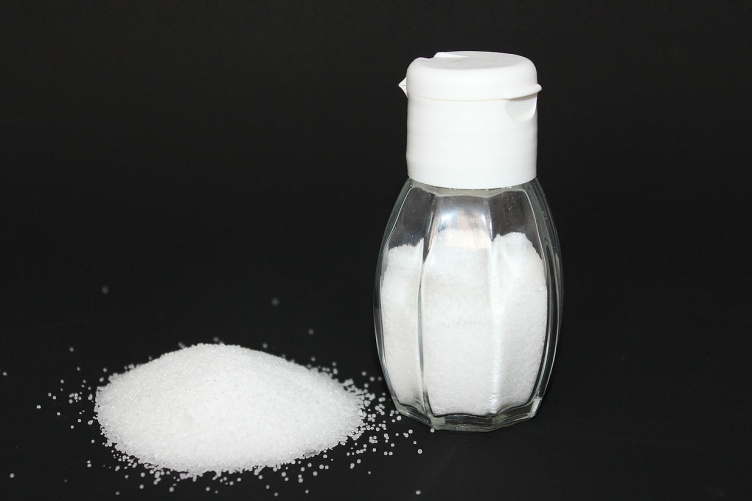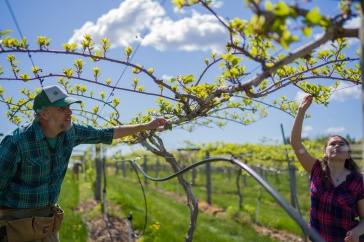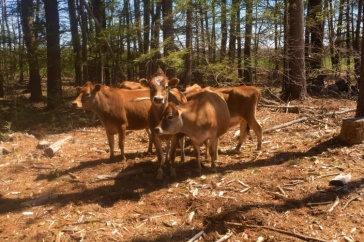
New research from the NH Agricultural Experiment Station at the UNH College of Life Sciences and Agricultures shows that salt preserves the shelf life of wet brewers grains. Credit: Poyraz 72/Licensed with CC BY-SA 4.0.

brewers grains.
In the past decade, the number of New Hampshire craft brewers has increased from 15 to 93. What happens to all of that grain when the brewing process is complete? Fortunately, wet brewers grains have shown promise as a cost-effective, high-nutrient feed replacement for conventional dairy feed. And new research from the NH Agricultural Experiment Station at the UNH College of Life Sciences and Agricultures shows that salt preserves the shelf life of these abundant grains.
Developing innovative ways to use these by-products of the brewing industry increases the sustainability of food systems by decreasing waste, increasing added value from products left over during the beer brewing process, and decreasing production costs for farmers.
“Wet brewers grains are good alternative feed source that can replace expensive conventional feed supplements such soybean meal and cornmeal, as it was shown in our previous research. Moreover, treating wet brewers grains with salt would not only increase the shelf life by decreasing mold growth and nutrient losses, but it also may increase microbial protein synthesis in heifers,” said experiment station researcher Peter Erickson, professor of dairy management. The research was conducted with former doctoral student Eric Hatungimana at the experiment station’s UNH Fairchild Dairy Teaching and Research Center.
Microbial proteins are produced by the billions of bacteria that live in the rumen—the largest stomach compartment—of cows. The bacteria are the main source of amino acids for ruminants such as cattle, sheep, antelopes, deer, and giraffes. For cows, increasing dietary protein and amino acid makeup can substantially increase milk production.
The brewery industry uses mostly malted barley to produce beer, leaving behind a protein-rich residue known as “beer waste” that is suitable for dairy cattle feeding. While farmers have been feeding wet brewers grains to cows for years, there is limited data on feeding it to heifers—young females that have not borne a calf.
Erickson and Hatungimana previously found that including these wet brewers grains in the diet of dairy heifers at a rate of 20 percent can replace soybean or corn-based feed and provide similar growth performance. Moreover, replacing corn and soybean meal with wet brewers grains reduces the feeding cost for raising dairy heifers by about 20 percent.
However, storing wet brewers grains has been problematic as they spoil quickly if not treated. The grains heat up during summer more than cooler times, and spoilage can occur, albeit at a lesser rate, in the winter. This research shows that minimally treating wet brewers grains with salt, which is inexpensive, not only improves shelf life by reducing the growth of mold but also increases microbial protein synthesis.
And while this research was not carried out to measure growth performance, scientists found an increase in body weight, average daily gain, and feed efficiency in heifers fed wet brewers grains treated with incremental levels of salt. Going forward, researchers plan to conduct a larger study to evaluate the growth performance of dairy heifers using the same experimental design.
There are approximately 94 dairy farms in New Hampshire with an average of 120 milking animals per farm, according to Granite State Dairy Promotion. And there are more than 90 breweries in the state, according to the NH Department of Business and Economic Affairs.
This research is presented in the Journal of Animal Science (DOI: https://doi.org/10.1093/jas/skaa393).
This material is based upon work supported by the NH Agricultural Experiment Station, through joint funding of the National Institute of Food and Agriculture, U.S. Department of Agriculture, under award number 1016574, and the state of New Hampshire. Collaborators include Agri-King of Fulton, IL, and Rock River Laboratory of Watertown, WI.
Founded in 1887, the NH Agricultural Experiment Station at the UNH College of Life Sciences and Agriculture is UNH’s first research center and an elemental component of New Hampshire's land-grant university heritage and mission. We steward federal and state funding, including support from the USDA National Institute of Food and Agriculture, to provide unbiased and objective research concerning diverse aspects of sustainable agriculture and foods, aquaculture, forest management, and related wildlife, natural resources, and rural community topics. We maintain the Woodman and Kingman agronomy and horticultural research farms, the Macfarlane Research Greenhouses, the Fairchild Dairy Teaching and Research Center, and the Organic Dairy Research Farm. Additional properties also provide forage, forests, and woodlands in direct support to research, teaching, and outreach.
-
Written By:
Lori Tyler Gula, Ph.D., '19 | NH Agricultural Experiment Station | lori.gula@unh.edu | 603-862-1452
















































